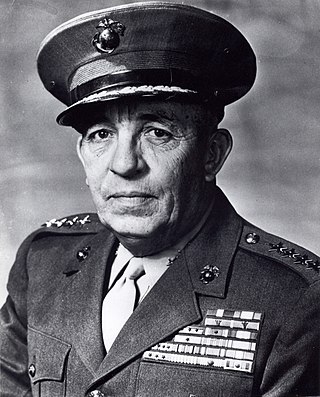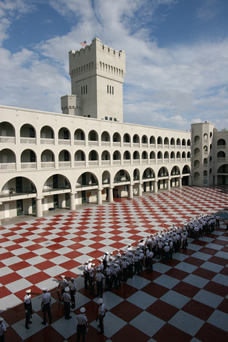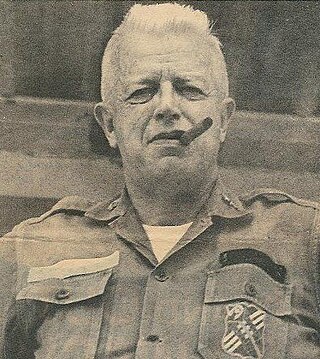
The Lords of Discipline is a 1980 novel by Pat Conroy that was later adapted in a 1983 film of the same name.

Wesley Lee Fox was a highly decorated United States Marine Corps colonel with 43 years of service. Fox was a combat veteran – receiving the Medal of Honor for his heroic actions during the Vietnam War – and is considered one of the Marine Corps' legendary heroes. After retiring from the Marine Corps, he wrote a book about his career: Marine Rifleman: Forty-Three Years in the Corps; and, he served for 8 years as deputy commandant for the Virginia Tech Corps of Cadets.

The Air Force Reserve Officer Training Corps (AFROTC) is one of the three primary commissioning sources for officers in the United States Air Force and United States Space Force, the other two being the United States Air Force Academy (USAFA) and Air Force Officer Training School (OTS). A subordinate command of the Air University within the Air Education and Training Command (AETC), AFROTC is aligned under the Jeanne M. Holm Center for Officer Accessions and Citizen Development at Maxwell AFB, Alabama. The Holm Center, formerly known as the Air Force Officer Accession and Training Schools (AFOATS), retains direct responsibility for both AFROTC and OTS.

The Citadel, The Military College of South Carolina, commonly known simply as The Citadel, is a public senior military college in Charleston, South Carolina. Established in 1842, it is one of six senior military colleges in the United States. It has 18 academic departments divided into five schools offering 31 majors and 57 minors. The military program is made up of cadets pursuing bachelor's degrees who live on campus. The non-military programs offer 12 undergraduate degrees, 26 graduate degrees, as well as evening and online programs with seven online graduate degrees, three online undergraduate degrees, and three certificate programs.

Valley Forge Military Academy and College (VFMAC) is a private boarding school and military junior college in Wayne, Pennsylvania. It follows in the traditional military school format with army traditions. Though military in tradition and form, the high school portion of VFMAC, Valley Forge Military Academy, is a college-preparatory boarding institution specializing in student leadership. VFMAC's administration is composed almost entirely of current or retired military and the board of trustees is almost entirely alumni. Some graduates pursue careers in the armed services and VFMAC has graduated one Rhodes Scholarship recipient.

The Missouri Military Academy (MMA) is a private preparatory school established on November 22, 1889, in Mexico, Missouri. The academy is a selective, all male, boarding school, grades 7 to 12. As a U.S. Army Junior Reserve Officers' Training Corps (JROTC) Honor Unit With Distinction, it has the privilege of nominating cadets to the U.S. Military Academy, Naval Academy, Air Force Academy, and Coast Guard Academy.
In the United States, a senior military college (SMC) is one of six colleges that offer military Reserve Officers' Training Corps (ROTC) programs under 10 U.S.C. § 2111a(f), though many other schools offer military Reserve Officers' Training Corps under other sections of the law. The six senior military colleges are:

Edwin Allen Pollock was a United States Marine Corps General and a highly decorated combat veteran of World War II and Korea; he commanded both the 1st and 2d Marine Divisions and is the only man to have served as commanding general of both the Atlantic and Pacific Fleet Marine Force. He had been advanced to the rank of general upon retirement by reason of having been specially commended in combat.

The Association of Military Colleges and Schools of the United States (AMCSUS) is a nonprofit service organization of schools with military programs approved by the Department of Defense and which maintain good standing in their regional accrediting organizations. The purpose, as put forth in the AMCSUS Constitution, is "to promote the common interest of all members and to advance their welfare; promote and maintain high scholastic, military and ethical standards in member schools; represent the mutual interests of the member schools before the Department of Defense as well as the general public; foster and extend patriotism and respect for duly constituted authority; and cultivate citizens who love peace and who strive to maintain it."
Richard Woodward Colcock was the second Superintendent of the South Carolina Military Academy from 1844 through 1852.
Major General James W. Duckett, South Carolina Unorganized Militia served as the 14th President of The Citadel from 1970 to 1974, succeeding General Hugh P. Harris.
The Regimental Band and Pipes was founded on The Citadel campus in Charleston, South Carolina in 1909 with late marine general, Harry K. Pickett, in command. The marching band makes up one of the twenty-one companies of the South Carolina Corps of Cadets. In 1991, the band participated in the Edinburgh Military Tattoo in Edinburgh, Scotland becoming the first military college selected for the honor. They returned in 2010 as the only unit from the United States to appear at the Silver Jubilee of the Tattoo and appeared again in 2015.

The Battle of Tulifinny was a military engagement of the American Civil War that was fought from December 6–9, 1864 in Jasper County, South Carolina during Sherman's March to the Sea. Outnumbered five-to-one, a Confederate force led by Major-General Samuel Jones, consisting in part of the entire cadet corps of the South Carolina Military Academy, successfully defended a strategically important section of the Charleston and Savannah Railway from attacks by Union forces. The engagement was one of the rare occasions when the United States Marine Corps fought in combat during the conflict and was also the only occasion that the entire student body of a U.S. college fought in combat.
The President of The Citadel is the chief administrator of The Citadel. Previously known as the Superintendent, the title was changed in 1921 during the tenure of Colonel Oliver J. Bond.
The Krause Center for Leadership and Ethics coordinates the leadership and ethical programs at The Citadel in South Carolina. The Center, established in 2001, oversees the Four-Year Leader Development Model in which all cadets progress through leadership training.

The History of The Citadel began in the early 1820s with the formation of a militia and state arsenal in response to an alleged slave revolt in 1822. By 1842 the arsenal grew into an academy, with the Legislature establishing it as the South Carolina Military Academy. Cadets played a key role in the Civil War, by firing upon a federal ship three months before the war began. Many Confederate officers attended the school. Renamed in 1910 as The Citadel, the school's academic reputation grew. After moving the campus near Hampton Park in 1922, the college has grown substantially. Sixteen years after legal segregation ended in public schools, the Citadel saw the graduation of its first Black student, Charles D. Foster. After an equally rocky journey forward, the Citadel graduated its first female Cadet in 1999. The school has produced many military officers, business, and political leaders throughout its history.

Colonel John Peyre Thomas Sr. was an educator, politician and historian who served as 6th Superintendent of the South Carolina Military Academy.

Bobby J. Cox is a lieutenant colonel in the United States Army Reserve and a member of the South Carolina House of Representatives where he has represented the 21st District since 2019. He is a member of the Republican Party and a former Army Ranger.
Colonel Oliver James Bond, South Carolina Militia was an American educator and college administrator who served as both Superintendent and President of The Citadel from 1908 to 1931.

Lieutenant Colonel Thomas Nugent Courvoisie was a United States Army Officer and Assistant Commandant of Cadets at The Citadel who was the subject of The Boo, the first book authored by famed novelist Pat Conroy and the inspiration for “The Bear” in Conroy's novel The Lords of Discipline.













